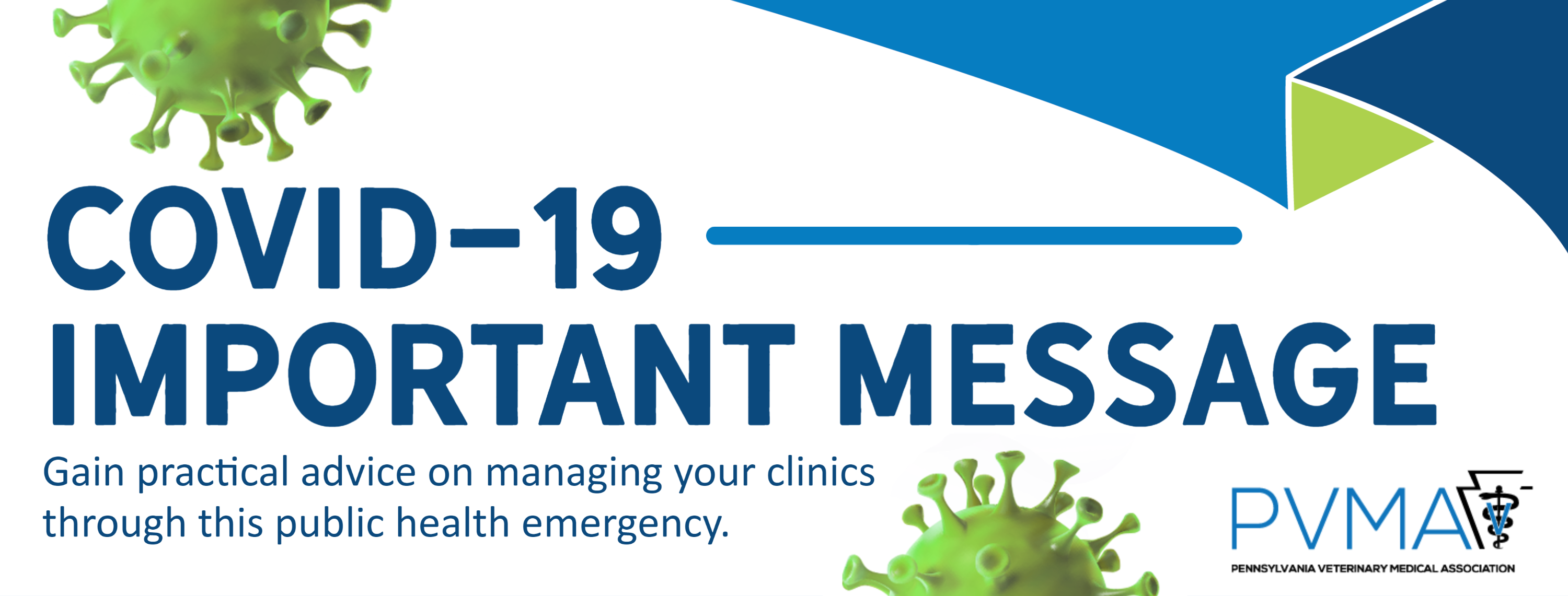
Gain practical advice on managing your clinics through this public health emergency.
Many PVMA members are calling us for practical advice on managing their clinics through this public health emergency, especially in areas such as Montgomery County, where the Governor has recommended the closing of all non-essential businesses. While each situation is unique, here are some suggestions to ensure that your staff and clients stay as safe as possible.
- Cancel all non-essential services for a minimum of two weeks. This is especially advisable in areas such as Montgomery County that have seen the largest number of confirmed cases of COVID-19.
- Limit office staff to those essential for treating emergent cases. This may mean a couple veterinarians and a couple technicians are available to treat sick and injured animals. Assign one staff person to meet the client and take them to an exam room in order to limit time spent in a communal waiting room. You may also consider allowing clients to wait in the car until they can be seen and calling their cell phone when you are ready to see them.
- Assign non-essential staff to tasks that don’t involve public contact. There are many important jobs in a veterinary practice that do not involve public interaction. Forward booking those cancelled non-essential services will help ensure a quick return to normalcy. Take inventory of supplies and update your patient hand-outs. Now is a good time to write that article you never seem to have time to tackle.
- Clean, clean, clean! Frequently disinfect surfaces that are frequently touched such as keyboards, doorknobs, countertops, and stethoscopes. Use no-touch trash receptacles. Place hand sanitizer throughout your clinic and encourage their use. Allow clients to use sinks to wash their hands if no sanitizer is available.
- Practice hygiene. Team members should avoid close contact with people who are ill; wash their hands with soap and water for at least 20 seconds; avoid touching their eyes, nose and mouth; and most importantly, they should stay home if they are sick. If they get sick at work, they should go home immediately.
- Sick team members who have symptoms of acute respiratory illness should stay at home and should not return to work until they are free of fever (100.4° F or lower, using an oral thermometer), signs of a fever, and any other symptoms for at least 24 hours without the use of fever-reducing or other symptom-altering medicine (e.g., cough suppressants).
- If a team member is confirmed to have COVID-19 – the practice owner should inform other team members of possible exposure while maintaining patient confidentiality. Anyone exposed should contact their physician or local health department to determine how to proceed.
- If you decide to close your office, make sure you have the closest emergency clinic information on your voicemail and website. You might also consider sending an email notification of the closure to all clients.
- In addition to these recommendations, the AVMA has great resources for veterinarians at AVMA.org/Coronavirus. You should also check Coronavirus.gov for up-to-date information from the CDC.
In addition to the information above, PVMA also wanted to share that Pennsylvania’s Animal Laboratory System (PADLS)will remain open despite multiple university closings.
